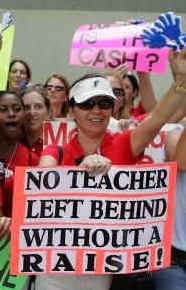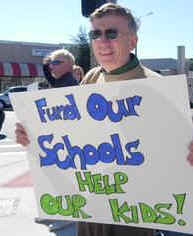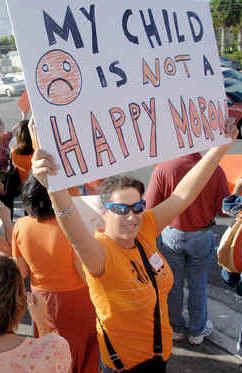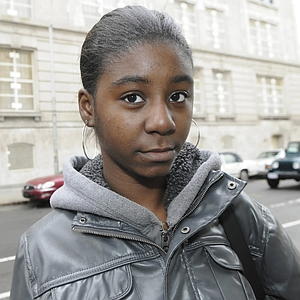Monday, April 12, 2010
Despite `sickout,' Miami-Dade schools open, but not all classes meet
 Miami-Dade schools were open Monday and parents were told their kids
should come to class as usual, despite hundreds of teachers planning to
call in sick to protest controversial legislation that would overhaul
teacher pay and tenure. But 48 teacher absences out of 80 at Charles Hadley Elementary in
West Miami-Dade resulted in the school canceling regular classes. About 8:15 a.m., dozens of parents clustered outside the main
entrance, many looking confused. Outside of the school, traffic came to
a standstill along Northwest Seventh Street. Parents didn't know what to do.
Miami-Dade schools were open Monday and parents were told their kids
should come to class as usual, despite hundreds of teachers planning to
call in sick to protest controversial legislation that would overhaul
teacher pay and tenure. But 48 teacher absences out of 80 at Charles Hadley Elementary in
West Miami-Dade resulted in the school canceling regular classes. About 8:15 a.m., dozens of parents clustered outside the main
entrance, many looking confused. Outside of the school, traffic came to
a standstill along Northwest Seventh Street. Parents didn't know what to do.
``They're saying it's going to be like a day-care,'' one father shouted across the courtyard to his wife, who remained in the family car with their young son. Many parents elected to take their children home. The kids, dressed in their forest green school uniforms, celebrated as they returned to cars with their parents. Francesca Lopez, 8, danced all the way to the car. ``No school today!'' the second-grader sang.
``I understand why the teachers are doing this,'' said her mother, Maria Ordonez. ``If this is what they need to do, I support them.''
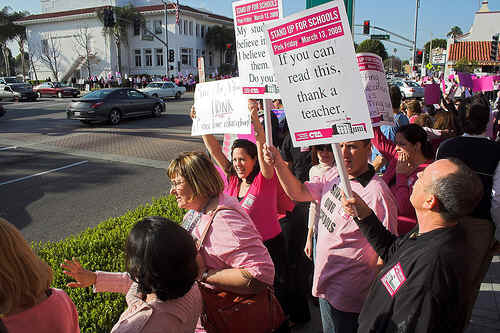
Word began spreading Friday that many teachers were planning to be absent from school on Monday to send a message to Gov. Charlie Crist on the bill known as SB 6, which was fast-tracked through the state Senate last month and passed in the House last week. Crist has until this Friday to sign the bill into law or veto it. The sweeping legislation, widely opposed by educators and teachers unions, would link teacher pay increases primarily to student performance on tests -- instead of on teachers' levels of education and years of experience -- and eliminate long-term job security for new teachers. Districts would have to divert 5 percent of their budgets to the state to fund the changes.
Supporters argue the law would reward effective teachers and make it easier to weed out bad ones. Opponents say provisions in the bill are vague and untested, and that Florida will have a hard time keeping and attracting teachers under the new rules. Crist has said the thousands of calls and e-mails his office has received in opposition to the legislation has been ``overwhelming.'' On Friday, he said that while he would prefer to see Miami-Dade teachers in the classroom on Monday, he understood some of the frustration that would lead them to protest by being absent.
Under Florida law, teachers cannot go on strike. United Teachers of Dade officials have said they do not promote a ``sickout.'' Neither does the Broward Teachers Union, though there has been no indication that Broward teachers planned to be absent on Monday. Miami-Dade teachers have postings on Facebook encouraging colleagues to rally against the legislation from 4 to 6 p.m. at Tropical Park in West Miami-Dade. They are pushing for their colleagues elsewhere in the state to do the same. But by 11 a.m., there were already more than 400 teachers on Bird Road in front of the park wearing black and carrying signs: ``Honk for education,'' ``Scores don't equal education,'' and ``SB6 makes me sick.''
Stephanie Farrington, a second-grade teacher at Kinloch Park Elementary who was at the protest, said the bill does not take into account outside factors that affect student learning. ``We're held accountable to a certain extent, but where do parents come in?'' she said.
More than half of the teachers at her school were at the rally, she estimated, adding that it was an extraordinary circumstance that called for them to be absent for the day. ``We don't do it to hurt the kids,'' Farrington said. ``We're actually doing it to help the future of the profession.''
Jessica Rodriguez, a six-year teacher who called in sick Monday, though she would not say to what school, said she just got a doctorate in curriculum and instruction and teacher salaries should respect advanced degrees. ``I'm raising my education to be a better teacher and they're just going to ignore it,'' she said.
Some teachers got wet by cars driving over puddles. Others carried umbrellas. A couple brought their kids or their parents to join the protest. Maria Marquez-Sterling, a third-grade teacher at Jane S. Roberts PK-8 Center in West Kendall, went to the rally with her husband, a former teacher. ``I think we're all tired of our voices not being heard,'' she said. ``The governor needs to hear the people,'' added her husband, Guillermo Marquez-Sterling. They said they feared less for current teachers than for the future of the profession, echoing a common sentiment at the rally. ``For me, they're killing education for a decade,'' Guillermo Marquez-Sterling said. ``Incoming teachers are not going to come.''
His wife said she did not think teachers would get in trouble for taking a personal day to protest. ``I don't feel threatened,'' she said. The couple did send their daughter, a freshman, to class at Southwest Miami Senior High. She told her parents she was in the auditorium with other students whose teachers were absent.
At John A. Ferguson Senior High School in West Kendall Monday morning, the teacher parking lots weren't as full as usual. Out of about 800 teachers, 74 were absent, according to school district records. ``There's nobody at school,'' said 17-year-old Stephanie Barrios. ``Everyone's being relocated to the cafeteria and gym.''
But it was ``business as usual'' at Michael Krop Senior High in Northeast Miami-Dade, where 20 out of 250 teachers called in sick. Principal Matthew Welker called that normal, saying he only starts to worry when it's 30 or more. Welker credited the teachers showing up with a meeting he had Friday with union representatives, teachers and students to defuse the situation. ``It helped frame the response,'' Welker said. ``We want their thoughts and opinions to be shared but wanted to come up with more constructive forums and opportunities to express their thoughts to the community and Gov. Crist.''
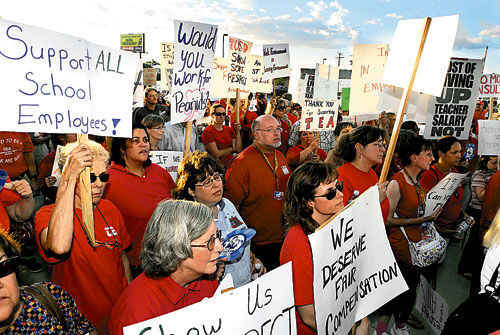
As a result, he said, the kids created a Facebook page calling for the governor to veto the bill. ``To their credit, they're responding to the issue and feel it's something they should get directly involved with,'' Welker said.
Miami Beach Senior High also used the proposed legislation and the surrounding opposition as a learning tool. Principal Rosann Sidener and her staff had students draft letters to Crist urging him to either sign or veto the legislation. The letters will be marched down Washington Avenue to the post office, and the student government has organized a 1:15 p.m. demonstration on Dade Boulevard. About half the student's 2,100 students stayed home Monday, Sidener said, and 36 of the school's 120 teachers called in sick. Sidener said there weren't enough substitutes to replace the three dozen teachers who called in sick, so some of Beach High's educators have ``doubled up,'' teaching both their class and an absent colleague's class. Sidener said the large number of absent students also made holding typical classroom lectures and class work difficult, because so many would have makeup work, so the school has created a daylong lesson focusing on the controversy of the bill.
On Sunday, the district estimated 5 percent of the teachers would be calling in sick. That's about 1,000 out of more than 22,000. The district planned on having substitute teachers and administrators ready to fill in and combining classes if necessary.
At Dr. Manuel C. Barreiro Elementary in West Kendall, teachers Gilat Schwartz and Marion Ortiz were putting up signs on fences saying school was on for Monday. ``Our Teachers ARE here!'' one sign read. ``School Is On!''
On Sunday night, Miami-Dade school district employees received automatic calls from the superintendent, urging them to report to their jobs and reminding them that ``it's important for the safety of the students.'' Personnel who had other plans for the day, such as professional development or meetings, were told to cancel those plans and report to their assigned work location.
The school district did cancel athletic events and activities that had been scheduled during school hours. But events scheduled for after the normal school day will not be affected. Many teachers called in sick last Friday, the day the House signed the teacher pay bill and delivered it to the governor. Barreiro, the elementary school in Kendall, had many of those absences. Parent Alfredo Quintero said he didn't leave his 9-year-old daughter, Keylin, a third-grader, at school when he realized teachers were out. ``I took my child to grandma's,'' Quintero said.
Quintero said he had not heard from the school over the weekend about whether teachers would be in Monday. ``We're hoping that they're here today,'' he said. Despite the hassle of not having teachers at school on Friday, Quintero said he understood some of their concerns. ``I think they're right to be protesting,'' he said. Another parent, Carla Schmid, agreed. Schmid took her kids home after learning that several teachers at Winston Park K-8 in West Kendall were out and substitutes were taking their place. ``So many teachers didn't show up,'' Schmid said. Schmid took her sons, who are in third and first grades, to school and then decided to take them home -- even though that would count as an unexcused absence against them. ``One day a year won't hurt,'' she said. ``I have to support the teachers.''
Miami Herald staff writers Adam H. Beasley and David Smiley and staff photographer Tim Chapman contributed to this report.
HS 'can't protect' whistleblower kid
|
|
April 15, 2010 Hell hath no fury like a school scorned.
|
A Brooklyn principal told the mother of a teen who exposed the failing high school as a violent, drug- and sex-filled hellhole that she can't guarantee the girl's safety -- even at the hands of teachers, the shocked mom told The Post.
Gutsy sophomore Alisha Strawder was barred from going to her classes at Paul Robeson HS Monday, a day after The Post quoted her blasting the bulk of the school's staffers and security guards as lazy and inept, her mom Kasyra Strawder said.
"You're telling me she can't get into the building because your staff members want to attack her because she told the truth?" a dumbfounded Strawder said she asked school officials.
"You're angry at the person who told the truth?"
Daughter Alisha had bluntly told The Post last week, "I want this school to close so bad." But instead of tightening the reins on the out-of-control school, officials put the 15-year-old in an office, when she showed up Monday and called her father to take her home, Kasyra complained. When the mother finally spoke with interim acting principal Simone Grey, she was allegedly told Alisha could come in only if she were put in isolation with a staffer -- and away from students and adults who may retaliate.
"Everyone has taken this personally. We cannot ensure her safety," Strawder quoted Grey telling her.
The distraught mom said she also received a phone call from a district official advising her Alisha will be granted a safety transfer to attend school elsewhere. Department of Education spokeswoman Margie Feinberg said officials were investigating the mother's claims, but she disputed her account -- saying Grey never told the mom Alisha wouldn't be protected.
"She said the child is not barred from the school and the child is welcome," said Feinberg.
Last week, Alisha Strawder battered the school as a dump where kids have sex and smoke weed in the stairwells, and where fights and pregnancies are the norm. "The boys pressure you," she complained. "A lot of girls will do anything and everything in the staircase."
She also hammered some of the teachers for being uncaring slackers who let students run amok. "If I could burn down this school and get away with it, I would," she said.
Alisha blasted some of the school safety officers as distracted, lazy and sleepy. Another student said yesterday The Post article brought renewed scrutiny to the struggling school. She said while some students applauded Alisha's truth-telling, many were upset she went public. "Everyone wants to fight her, to jump her," said the girl, who did not want to be identified for fear of retribution. "If they find her, they're going to beat her up."
Robeson was one of 19 schools slated to begin closing in June, until a judge recently ruled in favor of a challenge of the closures that had been filed by the teachers union and other groups. [susan.edelman@nypost.com]
Florida Senate passes SB 6 in a 21-17 vote // Read Bill
"For me, they're killing education for a decade,'' Guillermo Marquez- Sterling said. ``Incoming teachers are not going to come.''

truthout.org
— The arts are inherently
first-hand knowledge paradigms. Removing the arts from core curricula
must be reversed so that student have greater opportunity to develop
those aspects of creative, thinking, doing that is almost non-existent
in contemporary schools. Jazz improvisation, sculpting, poetry,
industrial arts all require first-hand knowledge.
Thursday, Jan. 28, 2010
Why We're Failing Our Schools
By Joe Klein
A remarkable thing happened in New York recently: the state legislature,
in effect, turned down the chance to win $700 million in federal money. No
one does that, except extremely conservative Southern governors (who
inevitably relent and take the money), oh, and occasionally teachers'
unions. A few years ago, I wrote here about the Detroit union that forced
the local government to reject a $200 million philanthropic gift to build 15
charter schools using a model that was already succeeding in the city. And
now we have New York's United Federation of Teachers (UFT), a storied crew,
thwarting the state's attempt to file an application that might have won
$700 million in Race to the Top education funds and again the issue is
charter schools, with a substantial dollop of teacher accountability thrown
in. If you haven't heard about Race to the Top, shame on the Obama
Administration. It was one of the most creative pieces of last year's $787
billion stimulus package. It established a $4.35 billion fund that Education
Secretary Arne Duncan could distribute to states on the basis of their
willingness to reform their schools. Duncan's definition of reform, a
common one these days, demanded more school choice and competition as
well as an emphasis on teacher evaluation and accountability. "Duncan
really nailed this," says New York City Deputy Mayor Kevin Sheekey.
"You can use federal funds to drive a reform agenda. You can buy
change, even from state legislatures, although in our case, the opponents
were pretty ingenious, invidious and ingenious." (See
10 elections that changed America.) The New York teachers' union was launched in 1960 and led in the early
years by the smartest and toughest union man I've ever met, Albert Shanker.
The teachers are among the most powerful interest groups in New York State
(and nationally, in the Democratic Party). The UFT's slogan is "A Union
of Professionals," but it is quite the opposite: an old-fashioned
industrial union that has won for its members a set of work rules more
appropriate to factory hands. There are strict seniority rules about pay,
school assignment, length of the school day and year. In New York, it is
near impossible to fire a teacher, even one accused of a crime, drug
addiction or flagrant misbehavior. The miscreants are stashed in
"rubber rooms" at full pay, for years, while the union pleads
their cases. In New York, school authorities are forbidden, by state law, to
evaluate teachers by using student test results. Toward the end of his life, Shanker began to realize the union was headed
down the wrong path. In a 1993 speech, he talked about the need for more
accountability: "I wouldn't be saying these things. if I didn't have
the sense that we are at the same point that the auto industry was at a few
years ago. They could see they were losing market share every year and still
not believe that it really had anything to do with the quality of the
product. I think that we will get and deserve the end of public
education through some sort of privatization scheme if we don't behave
differently." In the end, the challenge has come not from privatization
but in the
form of public charter schools, in which individual entrepreneurs are
chartered by states to create their own schools, according to their own
visions. Not surprisingly, those visions usually don't include the workplace
straitjacket that comes with unionization. The successful charters usually
have longer school days and years, more intense efforts to guide student
behavior, more creative or theme-oriented curriculums and more aggressive
evaluation of teachers. Not all these schools work. Indeed, it can be argued
that most states have been too slow to close down those that don't. But over
time, the results seem to be improving dramatically. A recent study showed
that students in New York City's charter schools, who are selected
randomly, by lottery, and are 90% African American and Latino have
closed 86% of the gap in test results between the poorest neighborhoods of
the city and ritzy suburbs like Scarsdale, which is known for its excellent
schools. There are national implications to this fight. As Shanker pointed out,
American schools have been slipping for decades, our students are now
32nd internationally in math scores, 10th in science, 12th in reading. It
will be impossible to rebuild our economy to create the sophisticated, high-
paying jobs we need as long as we have an archaic, industrial-age
school system. It's also hard to keep a strong democracy with a citizenry
that is increasingly uneducated and ill informed. No, teachers' unions are
not the only problem here. Troglodytic local school boards and apathetic
parents are just as bad. But the unions, and their minions in the Democratic
Party, have been a reactionary force in education reform for too long.
Barack Obama began to change that last year with Race to the Top. It's a
fight he needs to expand, and win.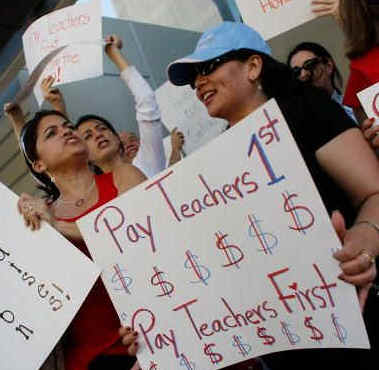
t
r u t h o u t | Teacher Accountability? It's About Time
